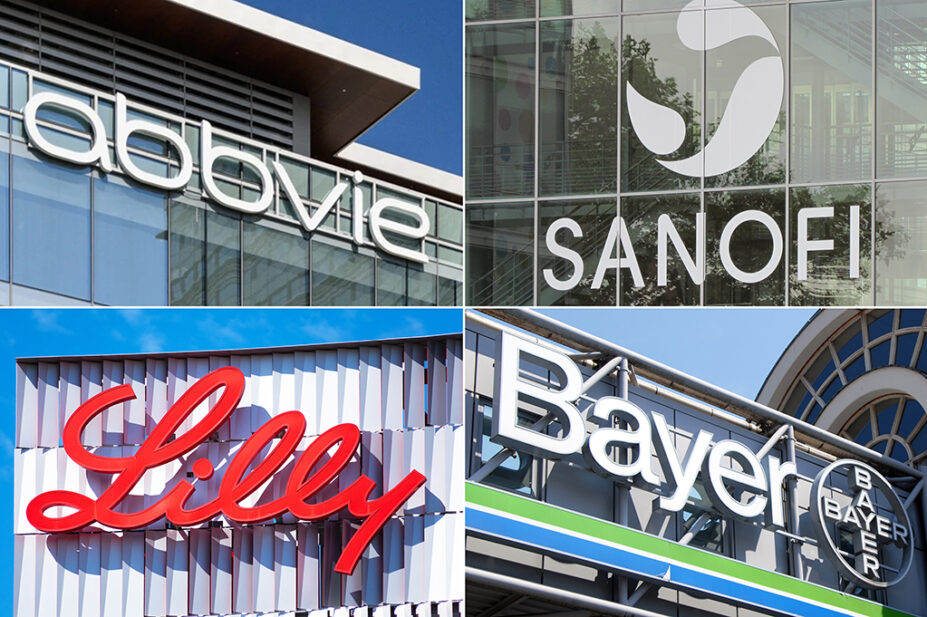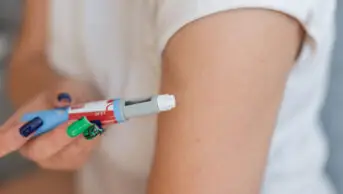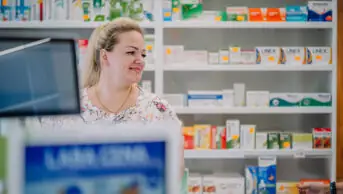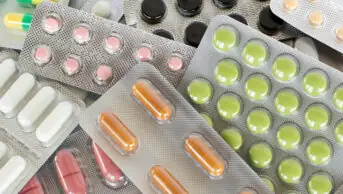
Abbvie / Shutterstock.com
The past three months have seen the rhetoric heat up around the UK government’s levy imposed on medicine manufacturers.
When the ‘Voluntary Scheme for Branded Medicines Pricing and Access’ (VPAS) was initially agreed in 2019, manufacturers were asked to pay the government 9.6% of their net income from sales of branded medicines to the NHS in exchange for various incentives to support innovation.
The aim was to limit the growth in NHS spending on medicines to 2% each year by adjusting the payment percentage accordingly. However, the levy rose sharply to 26.5% in 2023, largely the result of increased sales growth in 2021 and 2022, as a result of the COVID-19 pandemic.
This led to increasingly aggressive warnings from the Association of the British Pharmaceutical Industry (ABPI) and British Generic Manufacturers Association (BGMA) that the increasing rates could result in drug companies taking their research and manufacturing outside of the UK, which would ultimately cause delays to accessing new treatments for NHS patients and reduce supply of existing medicines.
Pulling out of the UK
Manufacturers themselves have also said they will take action, pouring millions of pounds into manufacturing and research overseas. In 2022, manufacturers AbbVie and Eli Lilly spent €460m on developing manufacturing facilities in Ireland, with both companies later announcing their withdrawal from the VPAS in January 2023, instead opting to pay an increased levy of 27.5% under the statutory scheme instead.
Getting the VPAS right is a win for patients, taxpayers and industry, so government must act urgently to rescue our partnership
Laura Steele, president and general manager for Northern Europe at Eli Lilly and Company
The ABPI said at the time that the companies’ move stemmed from increasing difficulties in justifying the voluntary scheme to global boardrooms, explaining that it is “easier to justify a statutory scheme, which is applied through direct legal imposition”. The statutory scheme, as set out in the Branded Health Service Medicines (Costs) Regulations 2018, applies to all manufacturers unless they choose to join VPAS instead, which offers additional incentives to support innovation.
At the time, Laura Steele, president and general manager for Northern Europe at Eli Lilly and Company, said: “Getting the VPAS right is a win for patients, taxpayers and industry, so government must act urgently to rescue our partnership.
“The current scheme has harmed innovation, with costs spiralling out of control and the UK falling behind other major countries to be left as a global outlier.”
Of the companies that remain enrolled in VPAS, such as Takeda and MSD (see Box), some have confirmed to The Pharmaceutical Journal that UK-based clinical trials — which are already in decline — would suffer further under the soaring levy.
“The current VPAS rebate rate leaves the UK as an outlier compared to the lower rates in other countries. This is a real risk to inward investment, the UK’s place as a life science destination, and, importantly, threatens our ability to get the latest medicines to UK patients,” says Véronique Walsh, general manager at Gilead Sciences UK and Ireland, which is still enrolled in the VPAS.
“If innovation is not established in a country, it becomes more difficult to bring the next generation of therapies into trials, and therefore patients will wait longer for new treatments.”
According to research published in October 2022 by the ABPI, as of 2020, patients were already waiting increasing lengths of time for a medicine after a clinical trial.
“Between 2018 and 2020, the median time between a clinical trial in the UK applying for regulatory approval and that trial delivering its first dose to a participant rose by 25 days to 247 days,” the research found, resulting in the number of industry clinical trials initiated in the UK per year falling by 41% between 2017 and 2021.
You are not going to do trials in therapy areas where you don’t think you can get the medicine reimbursed
Jessamy Baird, chief executive of Sanofi UK
Jessamy Baird, chief executive of Sanofi UK, says: “I would argue that [when VPAS rates were] around 6–7% in the UK, new decisions around early R&D [research and development] investment were not linked to VPAS. That situation has changed.
“When you are looking at a revenue tax of 27% it does bring up difficult questions, at a time when there is an existing decline in clinical trials.
“You are not going to do trials in therapy areas where you don’t think you can get the medicine reimbursed. Why would you trial a medicine in a country where you might not ultimately gain access for those drugs? It’s not ethical to do [trials] if you don’t think you can get reimbursement in that country,” she says, highlighting a need for a “healthy market” in branded medicines in all therapy areas.
“What [VPAS] could lead to is a reduction of suppliers of some classes of medicines. We have some originator off-patent medicines where we could end up being the single supplier — and if we have quality problems you’ve lost all the resilience. It’s not a position we want to be in.”
Existing supply chain issues
This would come at a time when the UK’s medicine supply chain already lacks resilience, with Mike Dent, director of pharmacy funding at the Pharmaceutical Services Negotiating Committee, warning in early 2022 that pharmacy contracters were “reporting problems obtaining more and more drugs”.
Later that year, 54% of respondents to The Pharmaceutical Journal’s annual salary and job satisfaction survey said that medicine shortages were putting patient safety at risk.
However, Haran Maheson, commercial lead for oncology at pharmaceutical company Daiichi-Sankyo, told The Pharmaceutical Journal in March 2023 that the threat from VPAS rates is mainly to “future products because the ecosystem is becoming more cost-prohibitive in many ways”.
“This time [in 2022] I’d have said [VPAS] was one of many things — National Institute for Health and Care Excellence (NICE) technical appraisals, methodology, the regulatory environment (which tends to be slow in the UK). However, that was a year ago. VPAS has become a clear and present challenge,” he says.
“NICE appraisal is quite challenging in itself. With VPAS added on, the whole ecosystem is becoming more punitive. It could mean discussions and decisions about not launching in the UK, just providing [new medicines] privately and with free of charge programmes if there is unmet need.
“There are different options on the table. All decisions will be on a case-by-case basis,” he continues, adding that the company was “watching and waiting” before making decisions.
A survey of ABPI members, carried out by consultancy firm WPI Strategy and published in February 2023, revealed “the higher the payment rate, the greater the negative impact on research and development (R&D) investment”.
The report predicted that only a rate below 10% would see R&D spending rise, while companies said their UK R&D investment would fall 20% from 2023 levels by 2028, under the current rates of 20–30%. Extrapolating from these figures, the report said this could represent a loss of £1.9bn in 2028.
And these losses will not be quickly recouped if the VPAS rate is lowered. “The clawback rates in the UK mean that we having to take difficult decisions about our UK operations,” says a spokesperson for Bayer UK.
“Many of these business decisions, including on personnel and our commercial footprint in the UK, cannot be easily or quickly reversed … If high payment rates continue, there is the very real risk of further disinvestment in the sector, which will be very difficult to unwind.”
Renegotiations
However, health economists are sceptical about the timing of the pharmaceutical industry’s rally against the VPAS.
“The timing of the pushback by industry is quite suspicious, since it’s happening in the run-up to the renegotiations,” says Olivier Wouters, assistant professor of health policy at the London School of Economics.
These actions seem like threats heading into renegotiations
Oliver Wouters, assistant professor of health policy at the London School of Economics
“A few firms have already said that they’re pulling out of the voluntary scheme, but that just means they’ll end up paying more under the statutory scheme. These actions seem like threats heading into renegotiations.”
The VPAS in its current form is set to expire at the end of 2023, with the ABPI and Department of Health and Social Care (DHSC) due to enter negotiations for a new scheme between spring and autumn 2023.
“They are recouping those costs globally so there is not much evidence to support their stance. I’m a bit sceptical. The link between domestic pricing policy and where companies hold clinical trials and site manufacturing capacity is not clear,” Wouters says.
He says that the clawback system is a vital one. “It is really important for the government to have a safety valve to protect NHS spending in case of a spike in spending. A lot of other European countries have similar mechanisms in place to relieve pressure on budgets in such cases — it’s not restricted to the UK.”
Mark Sculpher, professor of health economics at the University of York’s Centre for Health Economics, says: “[It is] ironic that, for many years, Ireland has been a popular place to manufacture pharmaceuticals, but its approach to drug pricing and reimbursement is no more generous than that of the NHS.
“It’s more to do with incentives, in particular corporation tax,” he adds.
In 2021, Ireland’s corporation tax was 12.5%, compared with 19% in the UK. However, in 2023, Ireland’s rate rose to 15% and the UK rate increased to 25%.
Instead, Sculpher says the controversy over VPAS is a sign of other failures.
“The real problem at the heart of this is that VPAS is really a backstop for a NICE approval process that doesn’t work as it should. If you had a NICE approval process that worked better, decisions would be made about new products that focus not just on clinical effectiveness but also cost-effectiveness and respected other valuable uses of the NHS budget,” he says.
“Research has shown that the cost-effectiveness threshold used by NICE is too high because the NHS can produce better outcomes from other activities at the same additional cost.”
NICE’s routine threshold requires each additional quality-adjusted life-year (QALY) generated by a new drug to cost no more than £30,000, “but [the] research shows that the NHS more generally can generate an additional QALY at approximately £15,000”, Sculpher explains.
“Rebates therefore become essential to limit expenditure on branded pharmaceuticals crowding out more productive funding elsewhere in the NHS.”
Pharmaceutical companies, by contrast, tend to believe the NICE cost-effectiveness threshold is too low. “Companies can’t have it all ways. They fought tooth and nail against reductions in the cost-effectiveness thresholds for drugs,” says Sculpher, leading to an increase in cost-effectiveness thresholds for some products, such as those for rare diseases and products used in end-of-life care.
However, Sculpher continues, an increase in cost-effectiveness threshold means the costs of these drugs to the NHS rises. Pharmaceutical companies then “also fight tooth and nail” against a blanket cap on profits such as VPAS.
David Watson, director of patient access at the ABPI, comments: “The UK spends considerably less per person on medicines than other comparable countries, using a number of mechanisms to negotiate and control pricing, including the cost/benefit determinations overseen by NICE.
“While we would like to see reform of the NICE appraisal system, since the pandemic, it is the voluntary and statutory schemes [that] have spiralled out of control and risk costing the UK economy far more than they save through lost investment, jobs and tax revenue.”
Watson adds the ABPI is “urging the government to agree to an ambitious new deal with the industry that can reverse this decline and puts us on a par with our global competitors”.
In March 2023, the ABPI proposed a fixed levy of 6.9% on profits made from selling medicines to the NHS; however, this was dismissed as “completely unaffordable” by the DHSC.
Following a request for comment from The Pharmaceutical Journal, a spokesperson for the DHSC, said: “The VPAS improves taxpayer value for money, and provides investment in patient access to medicines and wider NHS services.”
Negotiations on a new voluntary scheme, to be led by chief negotiations adviser Hugh Taylor, are expected to conclude by autumn 2023.
Nevertheless, Baird warns that the need for an agreement on VPAS is becoming urgent.
“Decisions for 2024 to 2025 are being taken in global boardrooms now and we need more than rhetoric to know we are being heard. We are hoping for that before the summer because those decisions will be locked in from June and July,” she says.
“VPAS has propelled the UK into global board room conversations, but not for the right reasons. Given where we are, what would our reasons be for us deciding to place our trials in the UK?”
Box: How are other manufacturers responding to VPAS?
A statement from MSD said: “A repayment rate of 26.5% on branded medicines sold in the UK creates an unsustainable and punitive commercial environment, one that threatens timely access to new innovation for UK patients.
“We are focused on ensuring the next voluntary scheme helps to achieve the ambitions for the life sciences sector under the ‘Life sciences vision‘. We believe the upcoming negotiations offer an opportunity to restore our global leadership in life sciences and unleash the full potential of this sector for both patients and the wider economic growth agenda.”
A statement from Takeda said: “The life sciences sector is globally competitive, and the declining shares of the UK’s global research and development spend, as well as clinical trial activity that we are seeing, alongside the significantly higher repayment rates in comparison to similar clawback mechanisms in other countries, is undermining the UK’s ability to attract inward investment.”
“Currently, we are focused on working in collaboration with the government to agree a sustainable voluntary scheme for 2024 and beyond that returns the UK to an internationally competitive settlement, so patients can continue to benefit from the strength of the UK life sciences sector.”
Laura Steele, president and general manager for Northern Europe at Eli Lilly and Company, commented: “We share the government’s ambition for the UK to be at the forefront of research into new medicines and to be a life sciences superpower. However, urgent action is needed to halt the current trend in disinvestment, prevent research being snapped up by other countries; and deliver on the government’s own ‘Life sciences vision’.
“Now is the time to reset and achieve a new sustainable, growth-enabling agreement that will deliver for patients, government, NHS and industry alike.”


